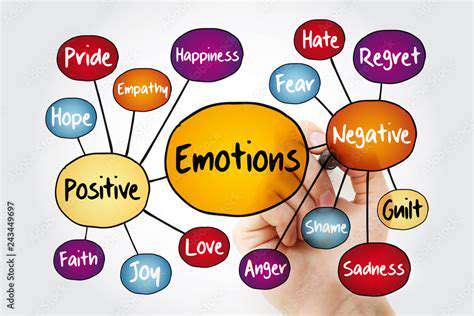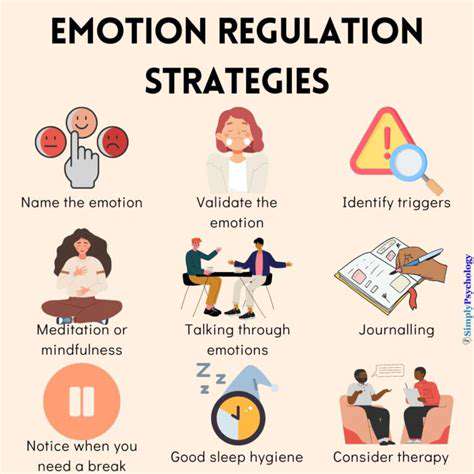Exploring The Depths of Emotional Responses in Human Behavior
The Nature of Emotional Responses
The Biological and Neurological Underpinnings
Emotional responses are deeply rooted in our biology and neuroscience. When we experience emotions, our brain processes and interprets sensory information, triggering a cascade of physiological responses. This includes the release of neurotransmitters such as dopamine, serotonin, and endorphins, which play critical roles in regulating our emotional state. The amygdala, a small almond-shaped structure in the temporal lobe, serves as the emotional processing center, quickly assessing potential threats and activating the body's stress response system, also known as the fight-or-flight response. This complex interplay between brain regions and neurotransmitters underscores the intricate and fascinating nature of emotional responses.
The neural circuits involved in emotional processing are highly dynamic and interconnected, with various brain regions contributing to the formation and regulation of emotional experiences. Research has shown that the prefrontal cortex, responsible for executive function and decision-making, can modulate the intensity and duration of emotional responses by regulating the activity of the amygdala. Additionally, the anterior cingulate cortex, involved in error detection and conflict monitoring, plays a key role in emotional processing by detecting and responding to emotional conflict.
The Influence of Environmental Factors
Environmental factors, such as upbringing, culture, and social context, significantly shape our emotional responses. Early life experiences, for instance, can influence the development of emotional regulation strategies, with some individuals learning to manage their emotions more effectively than others. Cultural norms and values can also impact emotional expression, with some cultures placing greater emphasis on emotional restraint and others encouraging more open emotional expression. Furthermore, social support networks and relationships can mitigate the negative effects of stress and anxiety, promoting emotional resilience and well-being.
The built environment and physical surroundings can also have a profound impact on emotional responses. For example, a person who regularly spends time in nature has been shown to experience reduced stress levels and improved mood compared to those in urban environments. Conversely, individuals living in areas with high levels of noise pollution, crime rates, or environmental degradation may experience increased stress and anxiety. These findings highlight the significance of environmental factors in shaping our emotional responses and underscore the importance of creating supportive and healthy living environments.
The Role of Cognitive Factors
Cognitive factors, such as perception, attention, and memory, play a vital role in shaping our emotional responses. Our perception of a situation can greatly influence how we feel, with individuals who are prone to negative thinking patterns more likely to experience anxiety, fear, or sadness. Attention, too, can affect emotional processing, with focused attention on emotions intensifying their experience. Memory consolidation, in which emotional experiences are stored and retrieved, can also impact emotional responses, with memories of traumatic events or past emotional experiences influencing current emotional states.
Our thought patterns, including rumination and reappraisal, can also influence emotional responses. Rumination involves repetitively dwelling on negative thoughts, while reappraisal involves reinterpreting the emotional significance of a situation. Individuals who practice reappraisal are more effective at managing their emotions, reducing stress and anxiety, and maintaining emotional well-being. Cognitive-behavioral therapy, a widely used therapeutic approach, targets these cognitive factors to help individuals modify their thought patterns and improve their emotional regulation strategies.
Emotional Responses in Everyday Life
Emotional responses are an integral part of our daily lives, influencing our thoughts, feelings, and behaviors. From the excitement of falling in love to the distress of losing a loved one, emotional responses shape our experiences and memories. In everyday life, emotional responses can be both adaptive and maladaptive, with healthy emotional regulation strategies enabling us to cope with challenges and maintain emotional well-being.
Practicing emotional awareness, recognizing and understanding our emotional states, is essential for developing effective emotional regulation strategies. This involves acknowledging and accepting our emotions, rather than trying to suppress or deny them. By cultivating emotional awareness, we can better navigate complex situations, build stronger relationships, and make more informed decisions that align with our emotional needs and values.
Conclusion and Future Directions
In conclusion, emotional responses are multifaceted and dynamic, shaped by a complex interplay of biological, neurological, environmental, cognitive, and social factors. Understanding the nature of emotional responses is essential for developing effective emotional regulation strategies, promoting emotional well-being, and improving overall quality of life. Future research should continue to investigate the neural mechanisms underlying emotional processing, the impact of environmental factors on emotional responses, and the development of evidence-based treatments for emotional disorders.
As we continue to explore the depths of emotional responses, we will undoubtedly uncover new insights into the intricate workings of the human brain and the complex interactions between emotional, cognitive, and environmental factors. This knowledge will enable us to develop more effective strategies for emotional regulation, promote emotional well-being, and foster a deeper understanding of the human experience.
Factors Influencing Emotional Responses

Biological Predispositions
Our emotional responses are deeply rooted in our biology. Genetic factors and neurochemical processes play significant roles in shaping how we react emotionally to various stimuli.
For instance, neurotransmitters like serotonin and dopamine are critical for regulating mood. An imbalance in these chemicals can lead to heightened emotional responses or diminished emotional stability.
Furthermore, different individuals have varying levels of sensitivity to hormonal changes, which can influence their emotional reactions. This biological variability is essential when considering the complexities of human emotion.
Understanding how biology impacts our emotions can provide a framework for treatments in mental health, emphasizing the importance of a holistic approach to emotional well-being.
Environmental Influences
The environment we inhabit significantly shapes our emotional responses. Factors such as socio-economic status, culture, and family dynamics contribute to how we experience and express emotions.
Cultural norms can dictate which emotions are appropriate to express, and to what extent. In some cultures, for instance, showing vulnerability may be frowned upon, while in others, it might be welcomed as a sign of authenticity.
Moreover, environmental stressors like urban noise, pollution, or community violence can trigger negative emotional responses, impacting mental health and relationships.
Recognizing the impact of our surroundings is crucial; it reminds us to cultivate healthier environments conducive to positive emotional experiences.
Psychological Factors
Psycho-emotional aspects, including personality traits and cognitive patterns, are vital in understanding emotional responses. For example, individuals with a high level of neuroticism may experience emotions more intensely.
Conversely, people with traits associated with resilience might process emotional events more effectively, leading to healthier emotional outcomes. These differences dictate how one perceives and reacts to life’s challenges.
Additionally, cognitive biases, such as negative thinking or catastrophizing, can distort how emotions are experienced. Addressing these biases through therapeutic approaches can significantly improve emotional regulation.
The interplay of psychological factors contributes to a diverse emotional landscape, inviting a deeper exploration of the mind's mechanisms that control feelings.
Social Connections and Support Systems
Social relationships are a powerful influence on emotional responses. The presence or absence of supportive networks can dictate how we process various emotional experiences.
Research indicates that individuals with strong social ties tend to experience lower levels of stress and anxiety. Support from friends and family can provide a buffer against negative emotional states, promoting resilience and emotional health.
Conversely, isolation can exacerbate feelings of loneliness and despair, leading to heightened emotional volatility. In this regard, fostering connections can be a crucial element in emotional well-being.
Ultimately, cultivating supportive social environments enhances our capacity to cope with emotional challenges, highlighting the fundamental human need for connection and belonging.
Strategies for Managing Emotional Responses

Understanding Triggers and Reactions
In the realm of emotional responses, identifying triggers is paramount. Recognizing which specific circumstances elicit strong emotions allows individuals to better prepare and manage their reactions. By observing patterns in emotional responses, one can discern which situations typically lead to heightened feelings of anxiety, anger, or sadness.
For instance, a common trigger for many people might be stress at work, which can lead to overwhelming feelings of inadequacy. When individuals understand that a looming deadline provokes anxiety, they can implement coping strategies, such as prioritizing tasks or practicing deep breathing. Developing effective coping mechanisms is essential for transforming emotional reactions into manageable responses.
Understanding the time and context in which emotional reactions occur can benefit individuals significantly. This insight is not just about the emotions themselves but also about the environmental cues that provoke them. By creating a supportive surroundings, individuals can reduce the frequency and intensity of certain emotional reactions. Implementing changes like reducing clutter or surrounding oneself with positive affirmations presents a proactive approach to emotional management.
Moreover, regular reflection on personal emotional responses creates opportunities for growth. By journaling or discussing emotions with trusted friends or counselors, individuals can work through their feelings. This practice fosters self-awareness, helping individuals differentiate between rational responses and emotional reactions.
In summary, understanding triggers is the foundation for effectively managing emotional responses. When individuals can identify and control these triggers, they position themselves to respond to their emotions more rationally and effectively in various life situations.
Implementing Effective Coping Strategies
Coping strategies are essential tools in navigating emotional responses. One highly effective approach is engaging in mindfulness practices, such as meditation or yoga. Mindfulness techniques help individuals remain present, reducing anxiety about past events or future worries. These practices can aid in anchoring emotional awareness, allowing individuals to observe their feelings without immediate reaction.
Another efficacious coping strategy is physical activity. Exercise releases endorphins, which are known to enhance mood. Whether it’s a brisk walk, a gym session, or an organized team sport, developing a regular fitness routine can be an excellent outlet for managing emotional stress and improving overall mental health.
Additionally, establishing and maintaining supportive relationships is crucial for emotional health. Having a network of friends, family, or support groups provides a sense of belonging and can significantly buffer against emotional turmoil. Such connections encourage open discussions about emotions, offering perspectives that may not have been considered before.
Creative outlets also serve as powerful coping mechanisms. Engaging in artistic activities, writing, or music can facilitate the expression of emotions that might otherwise feel overwhelming. This form of expression can be both liberating and cathartic, allowing individuals to process their emotions creatively and productively.
Finally, seeking professional help when emotions become unmanageable is a vital step for many. Therapists and counselors provide tools and techniques tailored to individual needs, helping navigate the complexities of emotional responses. Each of these coping strategies plays a distinct role in enhancing emotional intelligence and resilience.